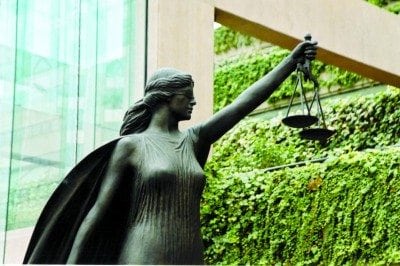TORONTO: Justice William Black of the Ontario Superior Court of Justice has rejected an attempt by former CBC journalist Terry Milewski and the Macdonald-Laurier Institute (MLI) to dismiss the defamation claim brought against them by Sikhs for Justice. The Court’s ruling in this case can be accessed here:
www.canlii.org/en/on/onsc/doc/2021/2021onsc7063/2021onsc7063.html
The suit, which will proceed to trial, stems from an article entitled “Khalistan: A Project of Pakistan authored by Milewski and published by MLI in 2020. The article claimed that the Referendum 2020 campaign organized by Sikhs for Justice is a “project of Pakistan” and that Pakistan influences or controls Sikhs for Justice.
Sikhs for Justice filed a claim for defamation to correct what they called false accusations. Milewski and MLI then brought a motion to dismiss the case as a “SLAPP suit” (strategic litigation against public participation).
Black, however, found that Sikhs for Justice met the “substantial merit” threshold of the legal test, meaning the claim of defamation is “legally tenable.” He found that statements in the report would tend to lower the reputation of Sikhs for Justice in the eyes of a reasonable person.
In the hearing, Sikhs for Justice (SFJ) highlighted the lack of any evidence to support Milewski’s claim that SJF is controlled or influenced by Pakistan. Indeed, Milewski admitted on cross-examination that there was no evidence to support many of his claims:
• He has no evidence to suggest SFJ is financially supported by Pakistan
• He has no evidence of any organizational involvement between Pakistan and SFJ
• He does not know if Pakistan is involved or has any influence in SFJ’s Referendum 2020 campaign
• He agreed that SFJ is its own agency, an independent entity
• He acknowledged much of the evidence in his article regarding Pakistan’s involvement in the Khalistan movement is from well before SFJ existed
• He has no evidence of any organizational involvement between Pakistan and SFJ
• He does not know if Pakistan is involved or has any influence in SFJ’s Referendum 2020 campaign
• He agreed that SFJ is its own agency, an independent entity
• He acknowledged much of the evidence in his article regarding Pakistan’s involvement in the Khalistan movement is from well before SFJ existed
Ultimately, Black accepted SFJ’s argument that Milewski provided “no evidence” in support of key allegations against SFJ. He concluded: “In other words, while there are factual matters presented in the article which can be proved, it appears that there are other matters presented as factual for which no evidence is provided.”
While Milewski had attempted to argue that the article presented his “opinion” rather than “facts,” Black recognized that Milewski’s public tweets defended the article as factual and this was inconsistent with his position on the motion.
Black, while ruling in favour of SFJ, stated that: “While of course freedom of expression is sacrosanct and while Canadians benefit from learning about the sometimes, violent activity of some Sikh separatists, it strikes me that these observations, while appropriate and fair, do not really address the complaint of SFJ relative to the article, as embodied in the SFJ-Pakistan Statements. The complaint SFJ raises about the article is not in relation to its treatment of historical violence, but rather goes to specific allegations in the Article about specific current influence by Pakistan over SFJ and its activities and mandate. If the Article did not contain these particular assertions, I think it is highly unlikely that SFJ would have brought its claim.”
“In my view the defendants’ position on this item again tends to conflate that which is in issue in the lawsuit – the specific SFJ-Pakistan Statements – with that which is not – an unfortunate history of violence on the part of some Sikh separatists.”
Milewski also attempted to argue the defence of “responsible communication,” but Black found that a trial judge may reject this defence on the basis of lack of diligence by Milewski, who did not even contact Sikhs for Justice for comment before publishing the false statements.
Black recognized that allegations of Pakistani influence over Sikhs for Justice “go to the very heart of the mandate of a not-for-profit group, whose reason for being and main endeavor is to advocate for a Sikh homeland and to promote a referendum to that end” and, in that way, the false allegations in the report “inevitably damage the reputation and operations of the plaintiff.”













